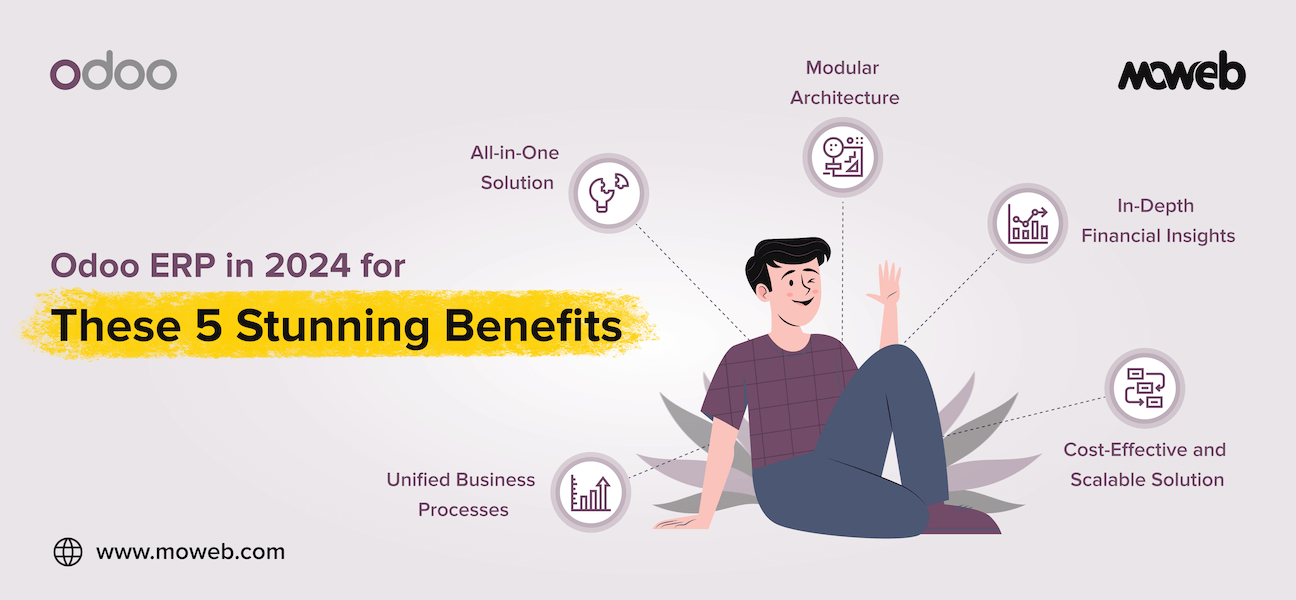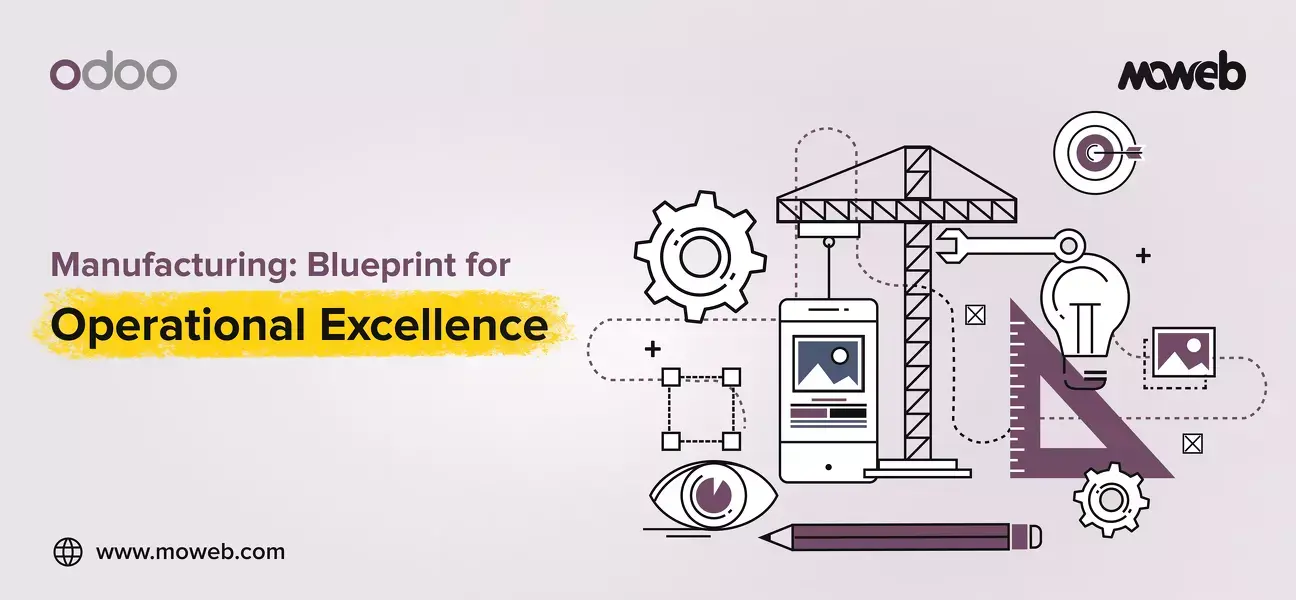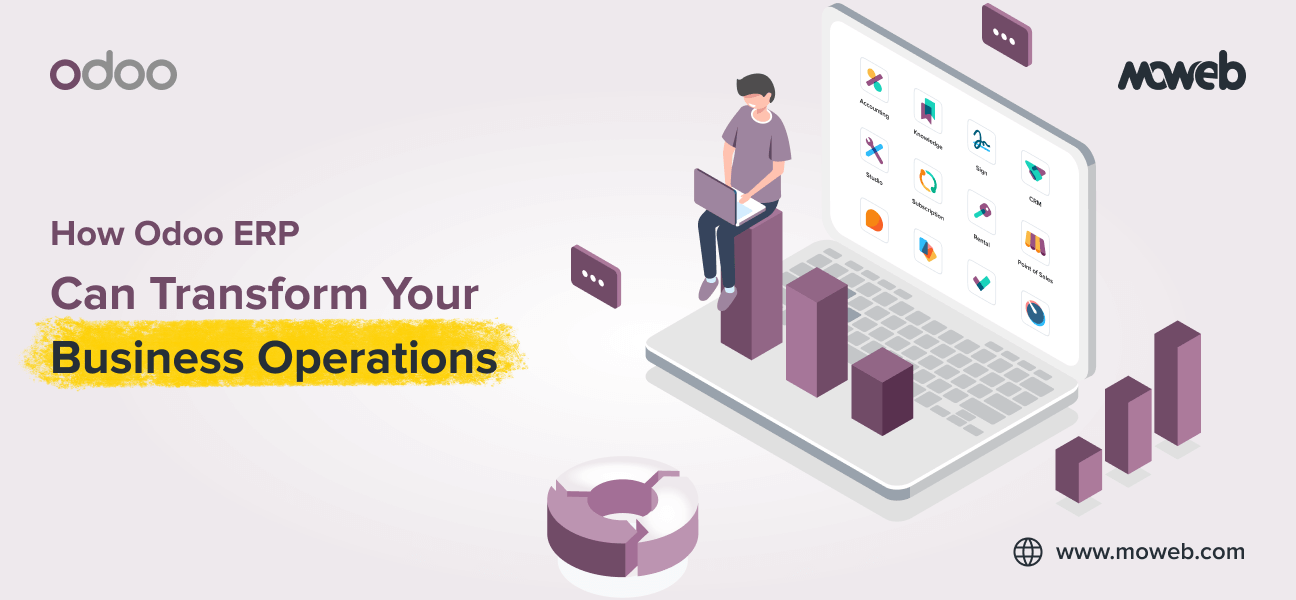
Businesses are Migrating from QuickBooks to Odoo ERP in 2024 for These 5 Stunning Benefits
Are you grappling with the decision between Odoo ERP and QuickBooks for your accounting needs? You’re not alone. Many businesses face the same dilemma, wondering which solution will better streamline their financial management processes and support their growth. As more businesses discover the comprehensive capabilities of Odoo ERP, many are making the switch from QuickBooks to Odoo in 2024. In this blog, we’ll explore five stunning benefits that make Odoo ERP a superior choice for businesses over QuickBooks.
1. All-in-One Solution For Comprehensive Financial Management
While QuickBooks Enterprise is one of the well-known software solutions for its robust accounting features, it primarily focuses on invoices, payroll, bookkeeping, and financial reporting. Odoo provides a comprehensive suite of business management tools that extend far beyond accounting. From CRM and inventory management to project management and e-commerce, Odoo’s integrated platform allows businesses to manage all their operations in one place. This all-in-one best accounting software solution not only simplifies workflows but also ensures better data accuracy and consistency across all departments.
2. Modular Architecture For Enhanced Customization and Flexibility
One of the standout features of Odoo ERP is its modular architecture. Businesses can start with the basic accounting module and then add additional functionalities as their needs evolve. This flexibility allows business applications to customize their ERP system to fit their specific requirements, ensuring they only pay for the features they actually need. QuickBooks, while powerful in its own right, lacks this level of customization and scalability, making Odoo a more adaptable choice for growing businesses.
3. In-Depth Financial Insights For Advanced Reporting and Analytics
Odoo ERP offers advanced reporting and analytics capabilities that provide deeper insights into a company’s financial health. Users can generate custom reports, track key performance indicators (KPIs), and utilize real-time data to make informed decisions. QuickBooks provides standard financial reports but lacks the advanced analytical tools found in Odoo. With Odoo’s robust reporting features, businesses can gain a clearer understanding of their financial performance and identify areas for improvement.
4. Unified Business Processes For Seamless Integration with Other Business Processes
Odoo ERP seamlessly integrates with various other business processes, ensuring a unified workflow across different departments. This integration eliminates data silos and enhances collaboration among teams. For instance, sales data can automatically update inventory levels, which in turn can trigger reordering processes. QuickBooks, while offering some integration capabilities, does not provide the same level of seamless connectivity across all business functions. Odoo’s integrated approach ensures smoother operations and better overall efficiency.
5. Cost-Effective and Scalable Solution For All Scale Businesses
When it comes to cost-effectiveness, Odoo ERP stands out as a highly scalable and affordable solution. Businesses can start with the basic modules and expand their system as they grow, avoiding large upfront costs. Moreover, Odoo’s open-source nature allows for greater flexibility in terms of customization and third-party integrations, often at a lower cost compared to proprietary software like QuickBooks. This scalability and cost-effectiveness make Odoo an ideal choice for businesses looking to maximize their ROI.
Here are some important factors to consider while choosing between Odoo ERP and QuickBooks
Choosing the right accounting software involves several key considerations:
- Business Size and Needs: Assess the size and specific needs of your business. Odoo’s modular approach makes it highly adaptable for growing businesses, while QuickBooks may be sufficient for smaller enterprises with straightforward accounting needs.
- Customization and Flexibility: Determine the level of customization you require. Odoo’s flexibility with its modules allows for extensive customization, whereas QuickBooks is more rigid but easier to set up.
- Integration Capabilities: Consider how well the software integrates with other tools and systems your business uses. Odoo’s comprehensive integration capabilities provide a seamless workflow across various business functions.
Let’s compare Odoo and Quickbooks for a head-to-head feature analogy that would help you further in choosing the right software.
| Key Feature | Odoo ERP | QuickBooks |
| Ease of Use | User-friendly interface with greater functionality | User-friendly interface |
| Customization | High, modular structure | Limited customization options |
| Scalability | Highly scalable for all business sizes | Ideal for smaller businesses |
| Integration | Comprehensive integration capabilities | Basic integration capabilities |
| Reporting and Analytics | Advanced reporting and analytics | Standard financial reports |
| Cost | Varies based on modules and users; free community version available | Fixed pricing tiers; additional costs for advanced features |
Let’s take a quick Software Features Comparison between Odoo ERP and QuickBooks
| Odoo ERP Features | QuickBooks Features |
| Comprehensive business management tools | Robust accounting and bookkeeping |
| Modular architecture for customization | User-friendly interface |
| Advanced reporting and analytics | Basic integration capabilities |
| Seamless integration with other business processes | Limited customization options |
Comparing price parameters between Odoo ERP & QuickBooks
| Odoo ERP | QuickBooks |
| Pricing varies based on modules and users | Fixed pricing tiers |
| Offers a free community version | Affordable for small businesses |
| Flexible cost structure based on business needs | Additional costs for advanced features and integrations |
Make the Smart Switch from Quickbooks accounting software solution to Odoo ERP, Today!
In the debate of Odoo vs. QuickBooks, Odoo ERP emerges as the clear winner for businesses seeking a comprehensive, flexible, customizable, and scalable accounting solution. Its all-in-one platform, advanced customization options, in-depth reporting capabilities, seamless integration, and cost-effectiveness provide compelling reasons to make the switch.
Ready to experience the transformative power of Odoo ERP for your business?
Contact UsOur Odoo experts are ready to help you customize and implement a solution for businesses tailored to cater to the unique requirements and range of features. Leverage our expertise to unlock the full potential of this powerful ERP system and drive your business toward sustainable growth and success.
Found this post insightful? Don’t forget to share it with your network!




